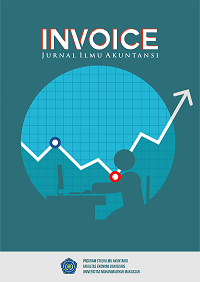The Effect of Money Ethic on Tax Evasion with Religiosity, Materialism, and Gender as Moderating Variables
DOI:
https://doi.org/10.26618/inv.v5i1.10138Abstract
This study aims to examine the effect of money ethics on tax evasion whit religiosity, materialism, and gender as moderating variabels. This research method uses quantitative descriptive methods and primary data using a questionnaire. The study took a samples of individual taxpayers (WPOP). The sampling technique uses incidental sampling. Data collection was carried out by leaving questionnaires in the form of google forms and questionnaires. The number of questionnaires that were processed was 120 questionnaires. Data analysis used in this study is a moderated regresion analysis whit an absolute difference test. The results showed that money ethics has a possitive effect on tax evasion. Intrinsic religiosity weakend the positive relationship between money ethics and tax evasion. Extrinsic religiosity, materialism aand gender strengthen the positive relationship between money ethics and tax evasion.References
Basri, Yesi Mutia. 2015a. “Moderation Effects of Religion and Gender on the Relationship between Money Ethics and Tax Fraud.” SNA 17 Mataram, Lombok : 1–23.
Dharma, L., R. Agusti, and P. Kurnia. 2016. "The Influence of Gender, Understanding of Taxation and Religiosity on Perceptions of Tax Evasion." Online Journal of Students of the Faculty of Economics, University of Riau 3(1): 1565–78.
Nauvalia, Friska Ade, and Yuniarti Herwinarni. 2018. "The Influence of Religiosity, Understanding of Taxation, Socioeconomic Status and Love of Money on Perceptions of Tax Evasion." Permana : Journal of Taxation, Management, and Accounting 10(1): 130–41.
Marsuni, N. S., Rohmatunnisa, I., Nirwani, N., Pontoh, G. T., & Mediaty, M. (2022). Analysis Of Accounting Information Systems (SIA) In Preventing Froud. SEIKO: Journal of Management & Business, 5(2), 94-102.
Akhmad, A., & Marsuni, N. S. (2019). Causality Relationship of Poverty, Unemployment Rate, and Economic Growth in South Sulawesi Province. Jurnal Ekonomi Balance, 15(2), 231-241.
Marsuni, N. S. (2019). PENGARUH PRAKTIK ISLAMIC CORPORATE SOCIAL RESPONSIBILTY (I-CSR) TERHADAP KINERJA KEUANGAN PADA BANK UMUM SYARIAH PERIODE 2014-2018.
Marsuni, N. S., & Ahmar, A. A. (2018). ANALYSIS OF INCOME LEVEL OF COCOA FARMERS IN SUPPORTING REGIONAL DEVELOPMENT IN IWOIMENDAA DISTRICT, KOLAKA REGENCY, SOUTHEAST SULAWESI PROVINCE. Jurnal Ekonomi Balance, 14(2), 247-252.
Marsuni, N. S., & Rismawati, R. (2018). INCOME AND COST ANALYSIS OF BUSINESS ACTIVITIES DEVELOPMENT AT THE BUSINESS DEVELOPMENT CENTER (P2B) STATE ISLAMIC UNIVERSITY OF MAKASSAR. Jurnal Ekonomi Balance, 14(1), 129-136.
Marsuni, N. S., & Yusuf, M. (2022). Concept of Financial Management in Islamic Perspective. INVOICE: JURNAL ILMU AKUNTANSI, 4(2), 346-352.
Marsuni, N. S., Said, D., & Indrijawati, A. (2022). Triple Button Line Implementation Through Corporate Social Responsibilty Program at PT. Semen Tonasa. Economos: Jurnal Ekonomi dan Bisnis, 5(2), 107-113.
Marsuni, N. S., Rasulong, I., & Adzim, F. (2022). Factors Affecting the Implementation of Good Government Governance (GGG) and Its Implications for Performance Accountability. Jurnal Ekonomi Balance, 18(1), 29-36.
Nuraprianti, Desi, Asep Kurniawan, and Indah Umiyati. 2019. “THE INFLUENCE OF MONEY ETHICS ON TAX EVASION WITH INTRINSIC RELIGIUSITY AND MATERIALISM AS MODERATION VARIABLES Accounting Study Program Sutaatmadja College of Economics Jl. Oto Iskandardinata No. 76 Subang.” 1(2): 161–79. www.pajak.go.id ,.
Oktaviani, Rachmawati Meita, Ceacilia Srimindarti, and Pancawati Hardiningsih. 2018. "The Role of Religionsity as a Moderator of Money Ethics Relations Against Tax Evasion Efforts." Journal of Accounting 22(1): 105–18.
Downloads
Published
Issue
Section
License
Authors who publish with Invoice: Jurnal Ilmu Akuntansi agree to the following terms:
Copyright Ownership
The copyright of all articles published in this journal remains with the author(s). However, the authors grant Invoice: Jurnal Ilmu Akuntansi the right of first publication with the work simultaneously licensed under a Creative Commons Attribution 4.0 International License (CC BY 4.0). This license allows others to share, copy, redistribute, adapt, and build upon the work for any purpose, even commercially, as long as proper credit is given to the original author(s) and the source.Licensing and Access
Invoice: Jurnal Ilmu Akuntansi provides immediate open access to its content on the principle that making research freely available to the public supports a greater global exchange of knowledge. All published materials are available freely without subscription or payment and can be accessed, downloaded, and reused by any user provided that appropriate attribution is given.Permission for Reuse
For uses not covered by the CC BY 4.0 license, such as commercial reprints, translations, or any form of adaptation without clear attribution, users must obtain written permission from the editorial team. Requests for such permissions can be directed to the editorial office at: [insert journal email here].Plagiarism and Originality
Authors are responsible for the originality of their submissions. All articles are screened for plagiarism using appropriate tools before acceptance. Manuscripts found to contain unoriginal content or infringing materials will be rejected or retracted as per journal policy.

